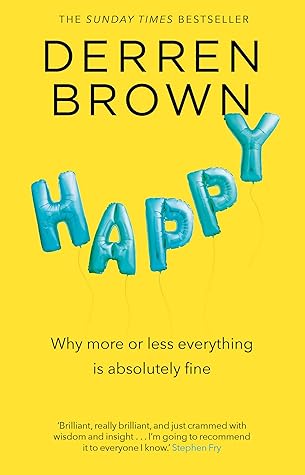More on this book
Community
Kindle Notes & Highlights
by
Derren Brown
Read between
March 15 - May 28, 2023
‘What upsets people is not things themselves but their judgements about these things.’
it is not events out there that cause our problems but rather our reactions to them: the stories we tell ourselves.
Confirmation bias occurs when we notice things in the world that support our beliefs and pay less attention to things that contradict them.
when one arrives one is still oneself, with whatever tendency towards dissatisfaction or restlessness that may bring.
Events and our chief aims can be in most cases compared to two forces that pull in different directions, their resultant diagonal being the course of our life.
Most of what happens in life is entirely out of your control, and while blind self-belief might disguise that fact for a while, it will eventually prove an anaemic opponent to brute reality.
Sociologists refer to ‘reference group theory’: the idea that in forming our self-identity, we compare ourselves to those in our peer group. Our cognitions, perceptions, attitudes and conceptions of ourselves are all tied in with those to whom we liken or contrast ourselves.
Driven as we are to form these self-evaluations, the groups with which we choose to identify will dictate whether we decide we’re doing well or falling short, and are thus a vital component of our feelings of well-being.
it is not what we own that satisfies us but rather what we have in relation to what we feel is possible and attainable for ourselves.
He believed that human beings are meant for greater things, and that a certain joy comes from fulfilling what is best and most noble in our nature.
If we hope for something deeper in life than distraction, we might note that our remembering, story-forming self needs a narrative of happiness in the same way our experiencing self requires its pleasures.
there is a deeper happiness to be had in knowing that your life is part of a story of flourishing than there is in merely pursuing entertainment.
we are not made for contentment.
Today’s crisis is that we don’t know how to honour our deep needs, and we mistake recreation for happiness.
More than any other time in history we suffer from a sense of entitlement, and it remains attached to a warped image of what happiness should be.
Unhappiness is seen as a sign of failure, not a healthy symptom of our natural condition.
If happiness lies in the relationship between what we desire and what we have, we are being encouraged to consider the first part of that equation rather than obsess over the second.
‘Everything we need is easy to procure, while the things we desire but don’t need are more difficult to obtain.’
‘Do not spoil what you have by desiring what you have not; remember that what you now have was once among the things you only hoped for.’
‘having a lower threshold for stimulation’.
If you are pained by external things, it is not they that disturb you, but your own judgement of them. And it is in your power to wipe out that judgement now.8 These are the words of Marcus Aurelius,
‘He who is not satisfied with a little, is satisfied with nothing’
An encouragement to see the positive in a situation will not be effective if it clashes with a deeper story we are telling ourselves.
There is much relief to be drawn from the realisation that things themselves do not dictate our responses.
Reinhold Niebuhr, from a 1943 sermon: God, grant me the serenity to accept the things I cannot change, The courage to change the things I can, And wisdom to know the difference.
learn to desire what you already have, and you will have all you need.
We shouldn’t expect perfection in ourselves any more than we should in the external world.
Perfection is not important, just keeping going is all that matters.
If we are able to find time and space each day to redress the balance, and if we use it to remind ourselves that so much of our life has nothing to do with us, and that it is only with our thoughts and actions that we need to concern ourselves, we will soon find that our centre of gravity returns to its correct place.
we tend to suffer from one of two basic fears: the fear of abandonment or the fear of being overwhelmed.
Lowering our expectations of the people around us is not to live at their whim and let them ‘get away with anything’; it is to stop obtruding our stories and priorities upon those of others and then whining when they don’t match up. Anger is just proof of how unrealistic your expectations were.
No longer mistaking our judgements about events for the events themselves; being open to the complex narratives that lead to the imperfect behaviours of others; deflating our exalted sense of self to a more modest measure; letting our experience of others decide what’s realistic to expect.
there but can’t experience: the noumenal world. ‘Noumenal’ comes from ‘nous’, in the sense of intuition; it describes the world we can intuit but not perceive – what lies beyond the reach of our senses.
Love is a risk: we attach ourselves to someone and they to us, and we face the world together.
happiness shows itself to be a kind of activity, something that happens through our fluctuating relationship to life, others, fortune and ourselves.
Heraclitus told us: ‘No man ever steps in the same river twice, for it’s not the same river and he’s not the same man.’
A good relationship, like a good parent or a good death, need only be ‘good enough’, consisting of two people navigating each other’s inadequacies with kindness and sympathy.


